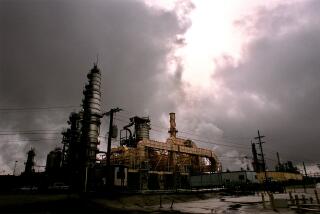OPEC Head Warns of Oil Surplus
- Share via
VIENNA — The president of OPEC cautioned today that current high levels of crude production could leave the world flooded with oil and markets in turmoil once the Persian Gulf crisis ends.
Sadek Boussena opened the winter conference of the Organization of Petroleum Exporting Countries by criticizing consuming nations for buying surplus oil now on the market to build up their stocks.
“This is clearly an ill-contrived move,” he said in a speech to ministers of the 13 oil-producing nations.
If a peaceful solution is found to the gulf crisis, caused by Iraq’s Aug. 2 invasion of Kuwait, “then the world will be awash with oil and we shall be faced with another decade of turmoil,” said Boussena, who is also Algeria’s minister of mines.
OPEC nations fear that too much crude on the market will drive down prices, leaving their countries strapped for badly needed revenue.
Boussena said that had the consuming nations drawn down some of their stocks to help make up for the loss of embargoed Kuwaiti and Iraqi oil, wide fluctuations in prices last fall might have been avoided.
“These consumers, however, have remained reluctant to adopt such measures, pushing OPEC to extreme levels of output,” he said.
Despite worries about high production, the OPEC ministers were considered unlikely to try to restrain production of member countries.
The ministers met for about two hours in formal session today at cartel headquarters in Vienna. They scheduled informal talks later in the day at the hotel where most were staying.
Iranian Oil Minister Gholamreza Aghazadeh backed off his demand Tuesday that the countries cut output now to get down to 22.5 million barrels a day. Today, he said the cutback should be made “after the crisis.”
The conference was the first time all 13 representatives had been at a cartel meeting since the invasion. Iraq and Libya did not show up for the last meeting, during which the quota system was suspended.
There were no sparks between Iraq and Kuwait, seated next to each other in the conference room’s alphabetical arrangement.
More to Read
Sign up for Essential California
The most important California stories and recommendations in your inbox every morning.
You may occasionally receive promotional content from the Los Angeles Times.













